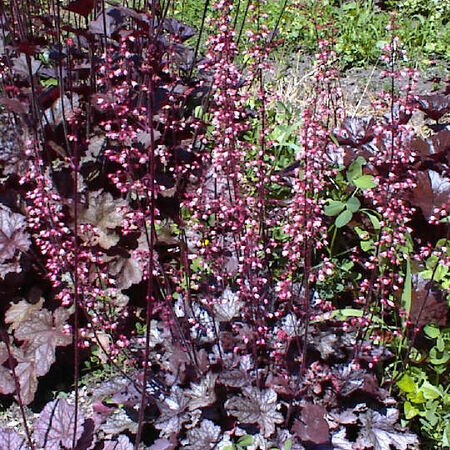Coral Bell's Purple Palace, Heuchera Seeds
Key Attributes
Key Attributes
Product Details
Weight
0.01Depth
0.12Height
4.5Width
3.25Plant Height
12-30"Botanical Name
Heuchera micranthaSeed Type
SeedAdditional Characteristics
Deer ResistantSeeds Per Gram
24,700Seeds Per Pound
11,200,000Packet
50 SeedsSow Depth
1/8"Seeds Per Ounce
700,000Breed
Open-pollinatedSun
Full Sun / Partial ShadeGrowing Conditions
Container FriendlyLife Cycle
PerennialSow Method
TransplantCategories
FlowersDays To Maturity (# Days)
90Components
Growing Instructions
![]() Learning Download: How to Grow Heuchera
Learning Download: How to Grow Heuchera
Heuchera are more commonly known as coral bells due to the flower’s shape. Heuchera are native to North America and its bell-shaped flowers attract hummingbirds to the garden.
Before Planting: Heuchera can tolerate full sun, but do best in partial shade.
Planting: Seeds can be started indoors, but they require a couple of month to become established prior to transplanting. If Heuchera seeds are planted in the fall, it will produce more flowers the following spring.
Watering: If grown in full sun, be sure to water extra.
Fertilizer: Fertilize Heuchera by applying a slow-release fertilizer up to three times a year.
Days to Maturity: Heuchera blooms will appear in late spring and early summer.
Harvesting: Heuchera seed pods should be harvested after the pods are dry but have yet to open.
Tips: If coral bells are grown in a damp and shady area, they can be prone to fungus. If fungus begins to cause problems, move the Heuchera to a sunnier, drier area.
Shipping Schedule
Our Seed Promise
 "Agriculture and seeds" provide the basis upon which our lives depend. We must protect this foundation as a safe and genetically stable source for future generations. For the benefit of all farmers, gardeners and consumers who want an alternative, we pledge that we do not knowingly buy or sell genetically engineered seeds or plants.
"Agriculture and seeds" provide the basis upon which our lives depend. We must protect this foundation as a safe and genetically stable source for future generations. For the benefit of all farmers, gardeners and consumers who want an alternative, we pledge that we do not knowingly buy or sell genetically engineered seeds or plants.
The mechanical transfer of genetic material outside of natural reproductive methods and between genera, families or kingdoms, poses great biological risks as well as economic, political, and cultural threats. We feel that genetically engineered varieties have been insufficiently tested prior to public release. More research and testing is necessary to further assess the potential risks of genetically engineered seeds. Further, we wish to support agricultural progress that leads to healthier soils, to genetically diverse agricultural ecosystems, and ultimately to healthy people and communities.
To learn more about the "Safe Seed Pledge" please visit www.councilforresponsiblegenetics.org.

